Products
Under the "Products" menu, management of the product range takes place. New products, categories, and attributes can be created here. Products can be created with or without template linkage (instead of a template, a static file, for products that cannot be customized, can also be used).
Overview
In the top menu item, product management occurs. An overview lists all created products along with associated information (article number, price, stock level, etc.) in a table format. They can be edited by clicking on them.
Product configuration
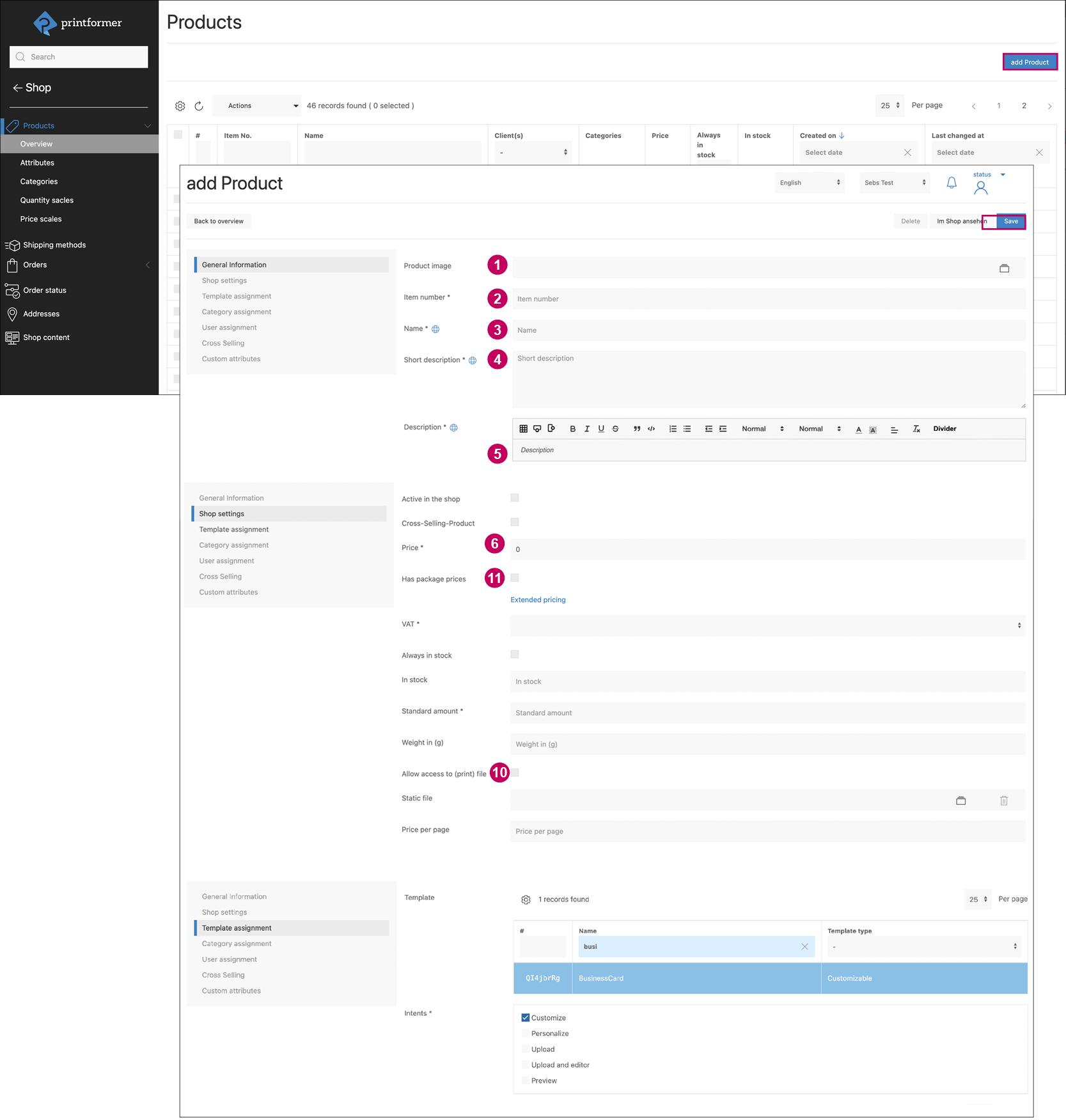
General information
Under "Product Image (1)", an image displayed in the shop can be uploaded.
After uploading the product image, you need to refresh the browser once for the image to appear.
The mandatory fields clients (= clients assigned to the product), Article No. (2), Name (3), Short Description (4), Description (5) are filled in accordingly.
The top button Im Shop ansehen generates a preview of the product within the closed shop.
Shop-Settings
The checkbox "Active in Shop" controls whether the item is displayed in the shop frontend or not.
By activating the Cross-selling product checkbox, the product only appears in the shopping basket, not in the product overview. It must also be assigned to another product in the Cross-selling menu. (It can therefore only be selected if the associated product has already been placed in the shopping basket).
Below that, the price (6) (separator ".") for the product is set along with the associated VAT. By checking the "Has package prices" box and clicking on "Advanced Pricing," quantity prices can be specified in an individual tiered structure. These are predefined under "Price Scales (11)," and additionally, a quantity scales (12) can be assigned to the product later.
The following section determines whether the product is constantly available (checkbox "Always in Stock") or limitedly available due to stock capacities: If the quantity specified under "In Stock" is exceeded during the ordering process, the product cannot be added to the cart. Additionally, the default quantity (8) is defined, and if desired, a weight (possibly required for postage calculation) can be specified.
The following points allow the user access to files after the ordering process.
Enabling "Allow access to (print) file" allows the user access to this file (including their customizations) in the order details section after the purchase.
When uploading a static file (13) without assigning a template later on, the user doesn't need to open the editor during the ordering process. The product is added to the cart, and the checkout process is completed. If the "Access to Print File" checkbox is activated, the file associated with the product will be available for download in the order details section for the user.
Note: If a static file is attached to the product, and a template is linked additionally with "Access to Print File" activated, both the file attached to the product and the file generated via the template will be available for the user to download in the order details section.
If the product is assigned to a producer (via a product attribute), the associated file attached to the product will be automatically transmitted accordingly.
The "Price per Page" field allows the definition of a page price, which is automatically considered in the price calculation within the shop (even if the user can add more pages in the editor).
In the price calculation, the existing pages in the template are already included.
For example, if the template has 2 pages and an admin set a price of €0.50, and a price per page of €1.00, the display in the ClosedShop would be €2.50 per copy. If the user adds another page in the editor, upon preview confirmation, a price of €3.50 per copy will be displayed.
Template-Assignment
Here, a previously created template is assigned to the product. Additionally, its usage is defined, indicating in what manner the template can be edited (Customize, Personalize, Upload, Upload & Editor, Preview). The desired usage for the product must also be enabled in the template configuration (if, for example, only Upload is enabled in the template, no other usage can be selected for the product).
If "Preview" is selected for the product's usage, the product contains a Preview button instead of the Design button. Upon clicking, the user directly lands in the PDF preview without first jumping into the editor.
Additionally, the product can be assigned a feed (for page planning) here. If a free format template is assigned, there is also the option to specify minimum and maximum sizes (for width and height).
When a template is updated, creating a new draft via the product will automatically use the current template version.
However, for existing drafts (repeated orders or projects), it always refers to the active template version at the time of draft creation. Updates to the templates are not considered in these cases. To prevent the use of outdated templates, a Reorder Lock Version can be set in the template configuration.
In the category assignment, each product can be assigned to a previously created category.
Under User Assignment, the created product can be restricted to specific users based on user or profile attributes. To select the desired user attribute, there's a search field.
Once three digits are entered, a drop-down menu appears with the applicable attributes. Additionally, existing product attributes can be adjusted for this product.
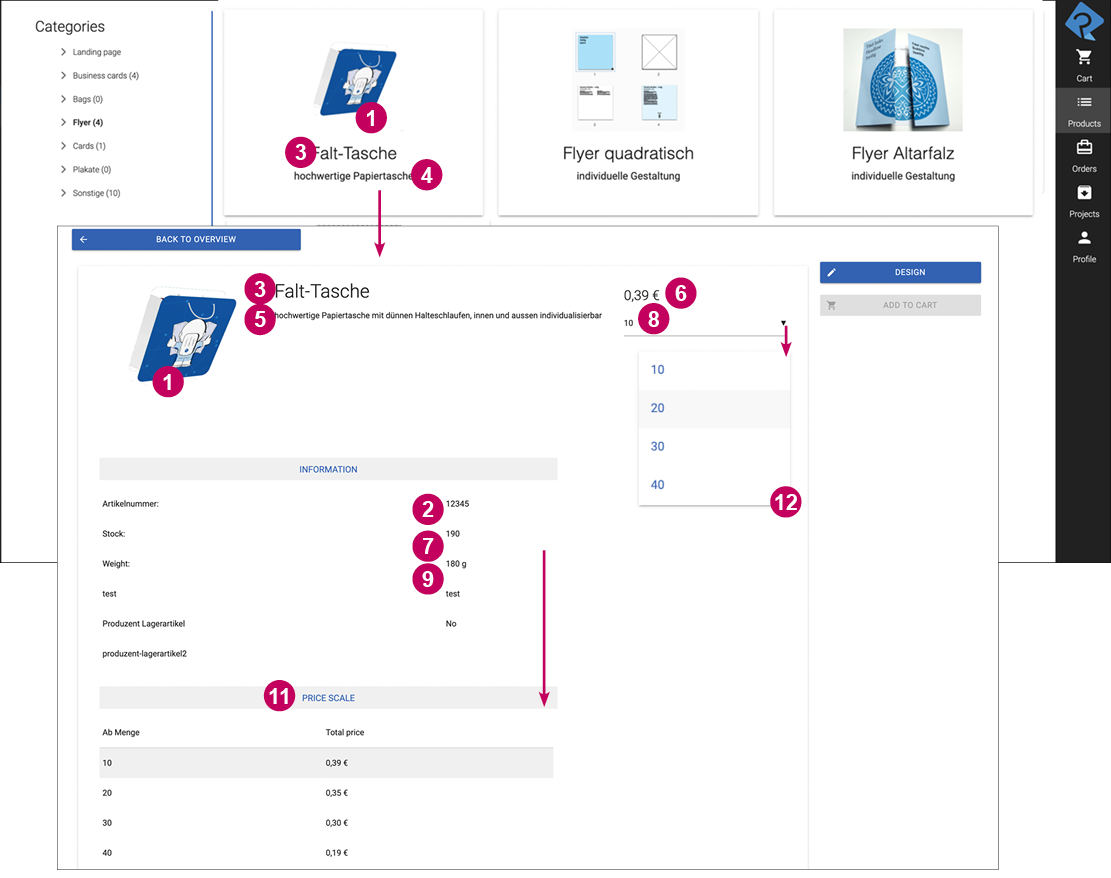
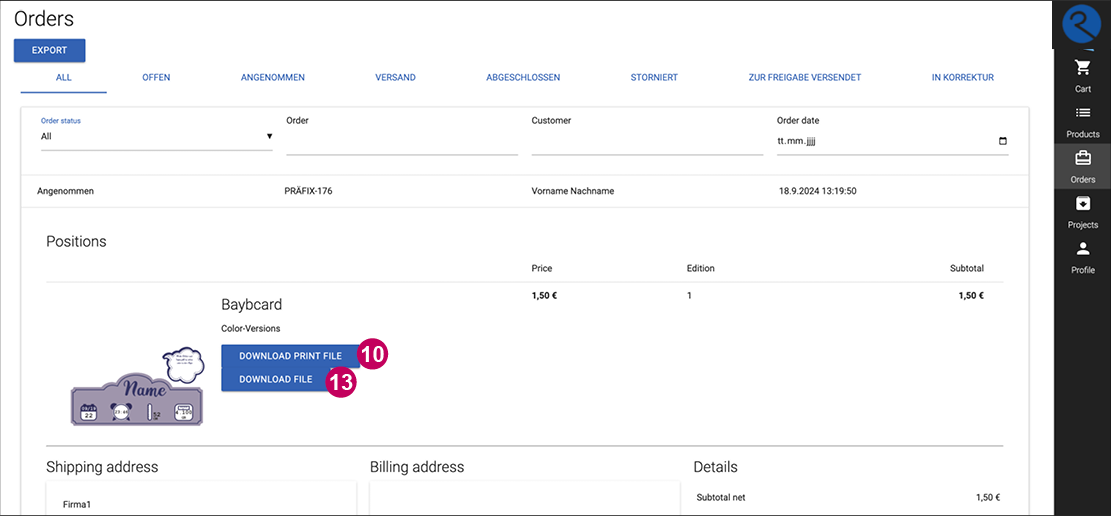
If there are products to be offered in the shop that cannot be customized, they are created as described earlier without the assignment of a template.
These products are then added directly to the shopping cart, either immediately or after specifying the quantity.
Cross-Selling
Cross-selling is a feature for products that should appear as additional products (associated with other products) as a suggestion in the shopping basket.
(E.g. balloons, for which a helium bottle can then be purchased).
In this menu you can select the products that should appear in the shopping basket as additional products:

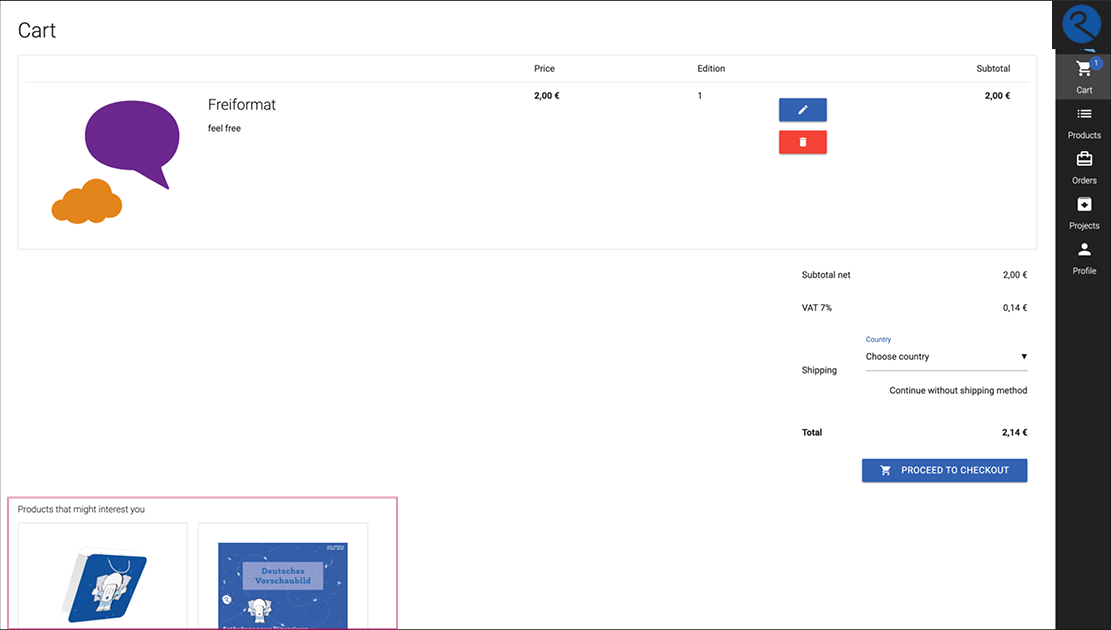
If the Cross-selling product checkbox is activated for a product, the product only appears in the shopping basket, not in the product overview. (It can therefore only be selected if the associated product has already been placed in the shopping basket).
Attributes
For the shop, just like for users, templates, and drafts, custom attributes can be created for individual products.
Adding a custom attribute: involves using a DataKey to reference the attribute's value in the template (e.g., pf-ca-Location, etc.). The Label represents the displayed name or designation, and the Type defines the display style of the attribute: Text, Checkbox, File, or Drop-Down. The attribute must be associated with one or more tenants.
In the sorting section, you can define the order of the created custom attributes using drag-and-drop. These settings are applied upon saving.
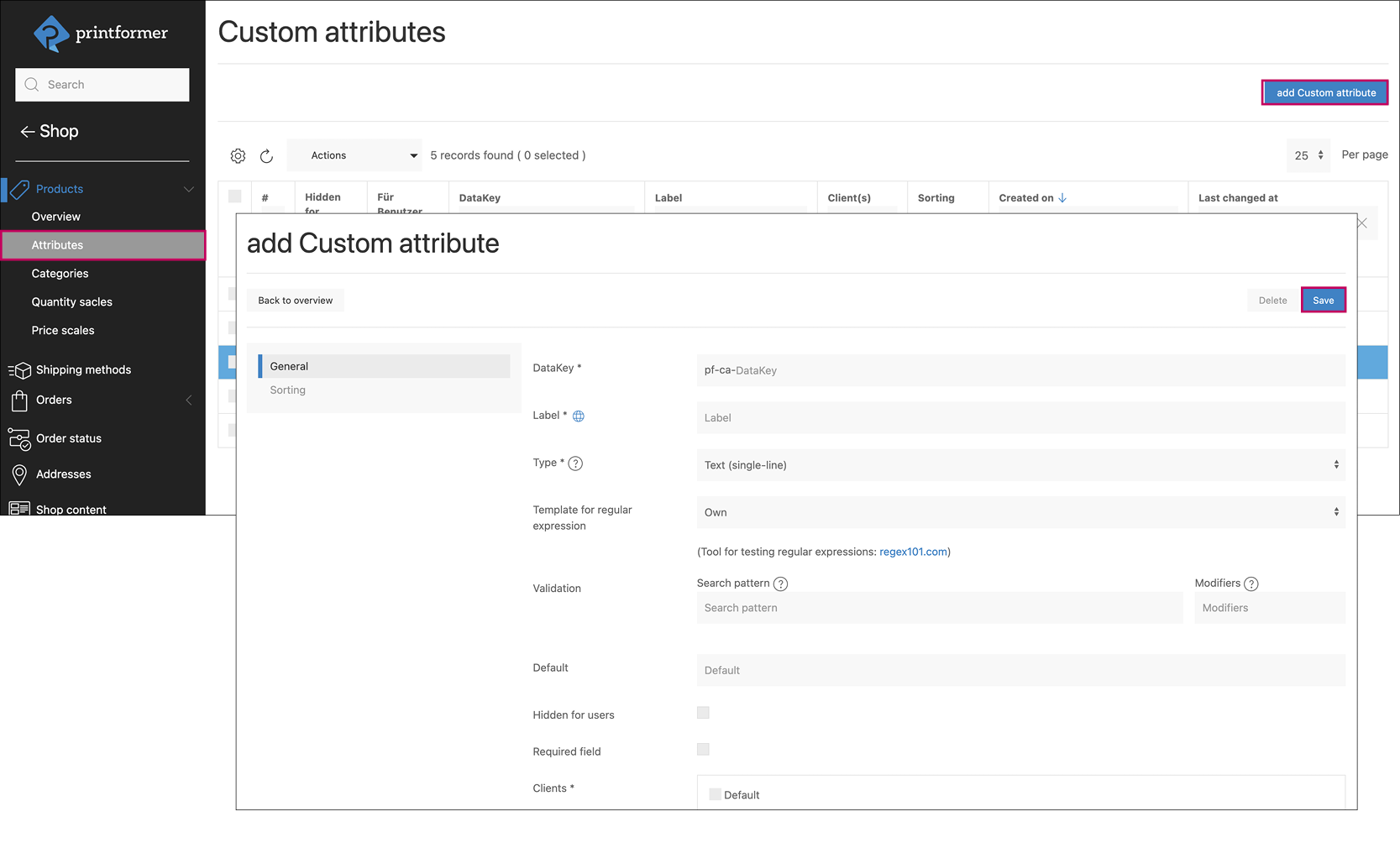
Categories
The larger a shop's product range, the more challenging it becomes to maintain an overview. To organize a larger product assortment and keep things manageable, categories can be created.
These categories are created, managed, and sorted within the Categories section. The existing sorting can be modified using drag-and-drop to rearrange them as needed.
Add categories
The "Active" checkbox determines whether the category is visible in the shop. Alongside mandatory fields like Name and Clients (to which the category is assigned), existing products can also be assigned to the category during its creation.
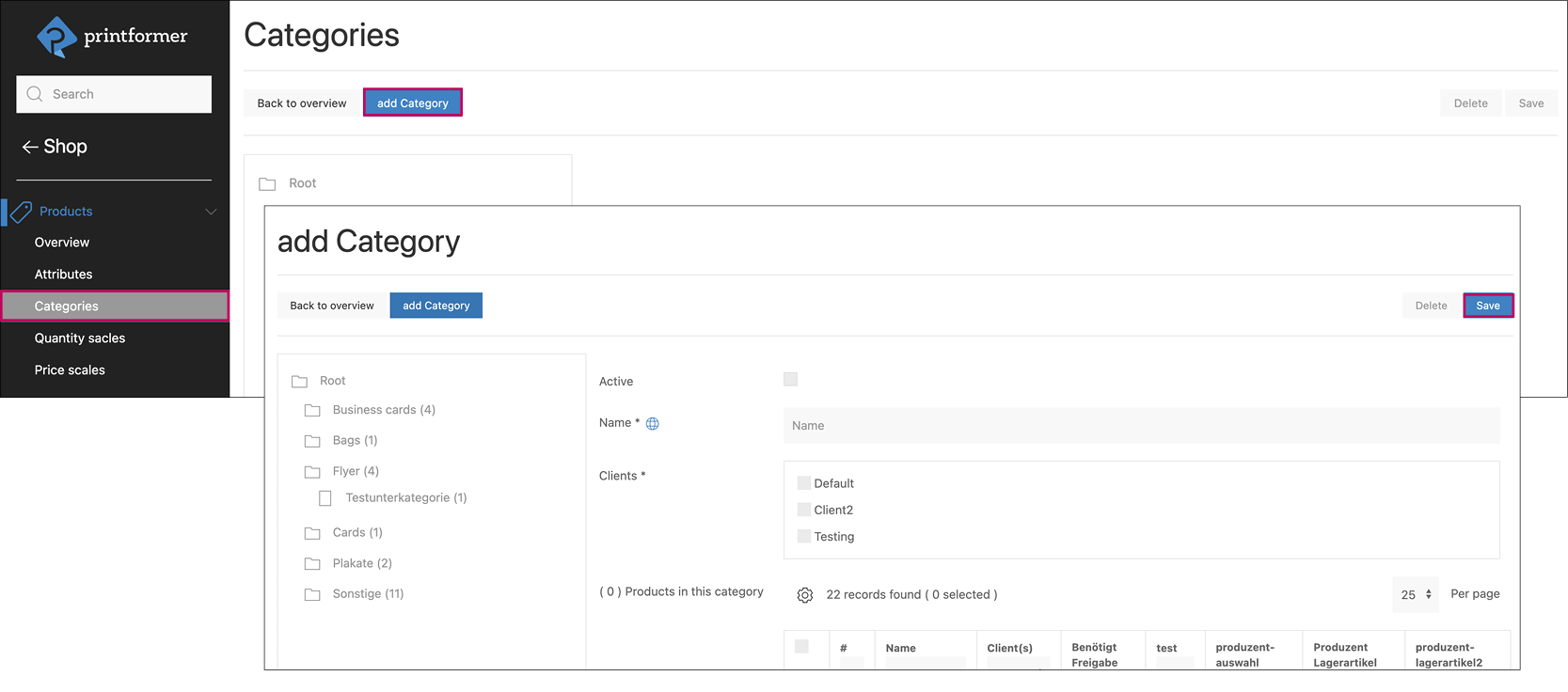
Quantity scales
Here, quantity dropdown settings can be defined. Apart from the linear setup (for instance, from 100 to 1,000 in increments of 10), there's an option for dynamic tiering (free determination of the steps). Following this setup, products are selected to receive this tiering.
Price scales
Here, quantity prices with individual tiers can be defined and assigned to specific products.
Initially, a name is given, then by clicking "Add," the quantity and price are set individually. Following this, the products to receive this tiering are selected.
